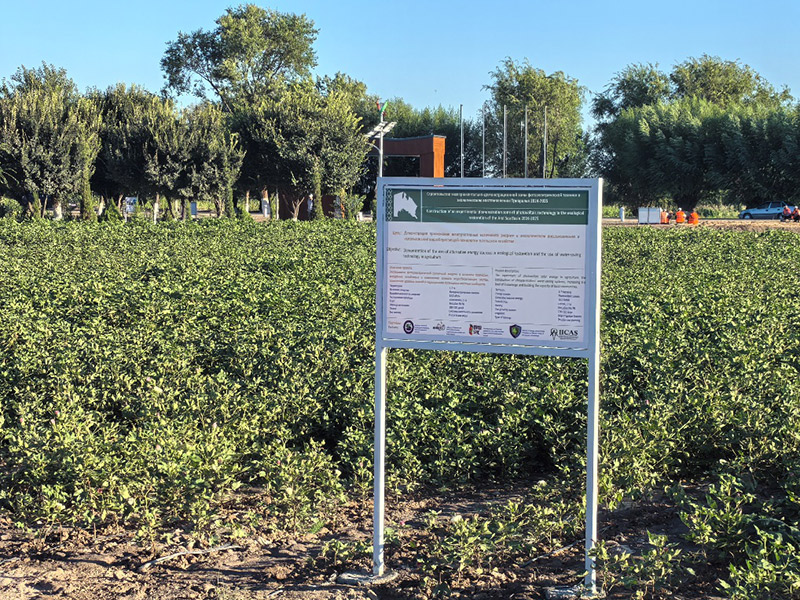
Progress on the Project of Integration, Experiment and Demonstration of Photovoltaic Technology in Ecological Environment Management of the Aral Sea
Photovoltaic Technology in Ecological Environment Management of the Aral Sea
10 01, 2025
Under the support of the Project of "Integration, Experiment and Demonstration of Photovoltaic Technology in Ecological Environment Management of the Aral Sea" funded by ANSO Joint Research Cooperation Special Fund and the Xinjiang Energy Chemical Co., Ltd. of the State Power Investment Corporation, the Xinjiang Institute of Ecology and Geography, Chinese Academy of Sciences(XIEG, CAS) has implemented a demonstration project combining photovoltaic technology with water-saving irrigation for cotton and integrated water-fertilizer management in Nukus, Karakalpakstan Republic, Uzbekistan. Over two consecutive years, this initiative has achieved water savings and increased cotton yields, significantly contributing to addressing water scarcity and salinization in the Aral Sea basin. The local government has highly recognized the demonstration project.In a recent letter, A.Orinbaev, Chairman of Jokargy Kenes of the Republic of Karakalpakstan, expressed gratitude to ANSO for implementing innovative projects locally, using advanced technologies to help address environmental challenges.
The Republic of Karakalpakstan, located in northwestern Uzbekistan, faces urgent ecological and socioeconomic improment due to climate change and salt dust storms caused by the drying up of the Aral Sea. To tackle the Aral Sea ecological crisis and meet Uzbekistan's pressing demands for comprehensive management and innovative development in the Aral Sea region, ANSO, along with the State Power Investment Corporation's Xinjiang Energy Chemical Co., Ltd., and XIEG, signed a trilateral cooperation agreement in July 2022 to promote deep integration of modern energy technologies with environmental improvement and socio-economic development.

Since the signing of the agreement, XIEG and the International Innovation Center for Aral Sea at the Ministry of Ecology, Environmental Protection and Climate Change of Uzbekistanhave co-organized academic conferences and technical training sessions, and established a joint laboratory. Starting from April 2023, the institute has carried out demonstrations of cotton mulching water-saving irrigation and application of photovoltaic technology in agricultural production in Nukus City. The experimental site, covering 3 hectares within the Aral Sea basin on moderately saline land, adopted solar power generation combined with water-saving drip irrigation under mulch and integrated water-fertilizer cultivation techniques for cotton. Over two years, the average yield per mureached 307 kg of seed cotton, far exceeding the local average of 120 kg per mu, while water consumption was approximately 70% of the local irrigation amount for cotton. Since both drip irrigation and fertilization were powered by solar energy, energy savings amounted to as high as 100%.This demonstrates that the sub-mulch drip irrigation and integrated water-fertilizer management technology from Xinjiang provides an effective solution for water shortage issues and enhancing agricultural productivity in Karakalpakstan. It also highlights the significant advantages and promotion potential of related Chinese technologies in the application on saline lands in the Aral Sea region.The international cooperation model of "new energy + ecological restoration + livelihood welfare" has facilitated the effective implementation of the project, playing a crucial role in supporting innovation and development in the Aral Sea region through science and technology. In the future, the three parties involved in the demonstration project will continue to leverage their respective resource advantages to make greater contributions to regional environmental improvement and sustainable development.

